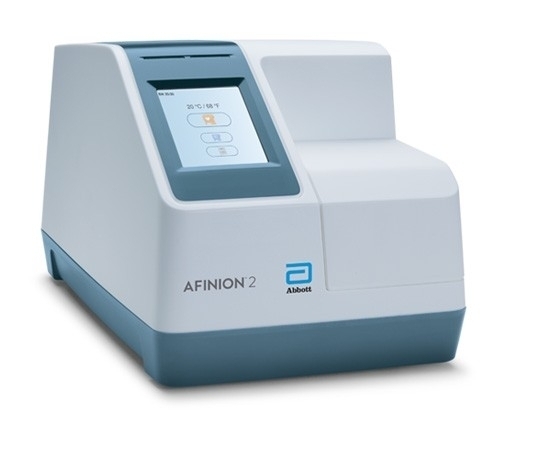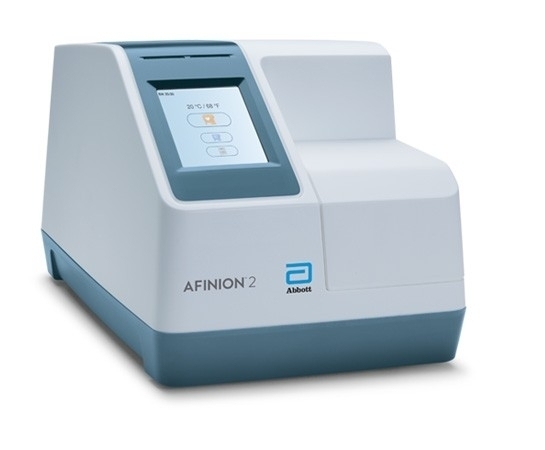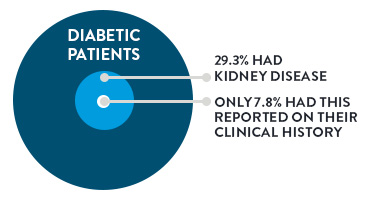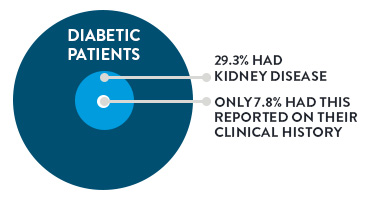Global point of care
Make every minute count
Patients with diabetes need prompt diagnosis along with ongoing monitoring and care, and the AfinionTM 2 System is ideal for point-of-care testing (POCT). With its compact size and the range of tests it performs, it’s ideal for POCT in various settings—from physician offices and clinics to community health centers, retirement homes, emergency rooms and hospital outpatient clinics. In 3 easy steps, using a fingerstick-sized sample, you can get accurate results for HbA1c, lipids, and albumin/creatinine ratio (ACR).
Reliability, precision, and speed—proven in the field
The Afinion™ 2 Analyser is the product of continual innovation and refinement, since 2005. The result is enhanced precision: every Afinion 2 System is factory calibrated and released in accordance with stringent specifications. Regarding HbA1c testing quality assurance, for instance, the reliability of the Afinion™ 2 Analyser is demonstrated by meeting all SKUP (Scandinavian Evaluation of Laboratory Equipment for Primary Health Care) quality goals.1
Download a guide on the accuracy and precision of Afinion™ HbA1c.



To find out more about how Afinion™ can transform your consultations, contact a member of our team today.
Improve practice efficiency with point-of-care testing
Incorporating POCT can allow for immediate therapy discussions, better patient outcomes, and enhanced clinic efficiencies. Studies2-5 show that testing in the office can increase efficiency by:
- Avoiding separate lab visits, where patients can be lost to follow-up
- Reducing the number of patient follow-up visits
- Limiting the number of venous draws
- Reducing administrative tasks—e.g. ordering lab tests and sending patient letters—which frees staff time
Point-of-care
30 minutes
- Streamlined and efficient with no patients lost in the process
- Better patient understanding
- Better clinician/patient relationship
- Better control of cardiovascular risk
Central Lab
Days
- Many steps can take several days with multiple visits, calls, and follow-ups
- Patient can get ‘lost’ along the way
- Inconvenient for the patient and provider
- Extra work for the practice


“Testing ACR, lipids, and HbA1c in real time using a reliable and accurate point-of-care test is essential. It means I can make treatment decisions based on the latest and most accurate information.”
– Prof. Med. Bernd Schultes, Endocrinologist/Diabetologist
St. Gallen, Switzerland


Provide Lipid and ACR POCT for CVD prediction and management
Diabetes is a complex disease that requires regular monitoring and care. People with diabetes are 2–3 times more likely to have cardiovascular disease (CVD).6 According to international guidelines, lipids and albumin/creatinine ratio (ACR) should be monitored annually.7-8 ACR is known to be a strong predictor for CVD.6,9
The Afinion™ Lipid Panel produces results in 7-8 minutes for total cholesterol (Chol), high-density lipoprotein (HDL) cholesterol, low-density lipoprotein (LDL) cholesterol, triglycerides (Trig), non-HDL, and Chol/HDL ratio. It is certified and accurate to CRMLN standards.10
ACR screening and monitoring are vital at the point of care
Since diabetic kidney disease (DKD) is such a serious complication of diabetes, patients’ albumin/creatinine ratio (ACR) should be monitored annually.7,8 A study of type 2 diabetes patients identified 29.3% of patients with DKD, but only 7.8% had this in their medical history.11 As highlighted recently ACR screening rates are extremely low in both diabetes (35%) and hypertension (4%) patients within 2 years.12 This is in contrast to the increasing number of effective therapies to prevent chronic kidney disease-related complications.
Download a guide on the accuracy and precision of Afinion™ HbA1c.



DID YOU KNOW...
An annual assessment of the ACR value in patients with diabetes, as recommended by the guidelines, may positively affect the diagnosis of diabetic kidney disease and subsequently allow better management of patients with diabetes.
– Schultes B, et al. 202113
References
- SKUP. Report from the evaluation SKUP/2021/126. Afinion 2 Analyzer (Abbott Diagnostics Technologies AS), a system for measurement of HbA1c. www.skup.org (accessed 1. Jan 2022).
- El-Osta A, Woringer M, Pizzo E, et al. Does use of point-of-care testing improve cost-effectiveness of the NHS Health Check programme in the primary care setting: A cost-minimisation analysis. BMJ Open. 2017;7(8):e015494.
- Patzer KH, Ardjomand P, Göhring K, et al. Implementation of HbA1c point of care testing in 3 German medical practices: impact on workflow and physician, staff, and patient satisfaction. J Diabetes Sci Technol. 2018;12(3):687-694.
- Lewandrowski EL, Yeh S, Baron J, et al. Implementation of point-of-care testing in a general internal medicine practice: A confirmation study. Clin Chim Acta. 2017;473:71-74.
- Crocker JB, Lee-Lewandrowski E, Lewandrowski N, et al. Implementation of point-of-care testing in an ambulatory practice of an academic medical center. Am J Clin Pathol. 2014;142(5):640-646.
- International Diabetes Federation. IDF Diabetes Atlas. 8th ed. 2017.
- 2019 ESC Guidelines on diabetes, pre-diabetes, and cardiovascular diseases developed in collaboration with the EASD. European Heart Journal 2019
- American Diabetes Association. Standards of medical care in diabetes—2022. Diabetes Care
- Matsushita K et al. Estimated glomerular filtration rate and albuminuria for prediction of cardiovascular outcomes: a collaborative meta-analysis of individual participant data. Lancet Diabetes Endocrinol 2015;3: 514–25
- Centers for Disease Control and Prevention. CRMLN (Cholesterol Reference Method Laboratory Network): List of Certified Manufacturers. Accessed February 25, 2022. https://www.cdc.gov/labstandards/crmln_certified_manufacturers.html
- Brugnara L, Novials A, Ortega R, et al. Clinical characteristics, complications and management of patients with type 2 diabetes with and without diabetic kidney disease (DKD): A comparison of data from a clinical database. Endocrinol Diabetes Nutr (Engl Ed). 2018;65(1):30-38.
- Shin JI et al. Albuminuria Testing in Hypertension and Diabetes. An Individual-Participant Data Meta-Analysis in a Global Consortium. Hypertension 2021; 1042-1052
- Schultes B, Emmerich S, Kistler AD, et al. Impact of albumin-to-creatinine ratio point-of-care testing on the diagnosis and management of diabetic kidney disease. J Diabetes Sci Technol. 2021;19322968211054520. doi: 10.1177/19322968211054520




